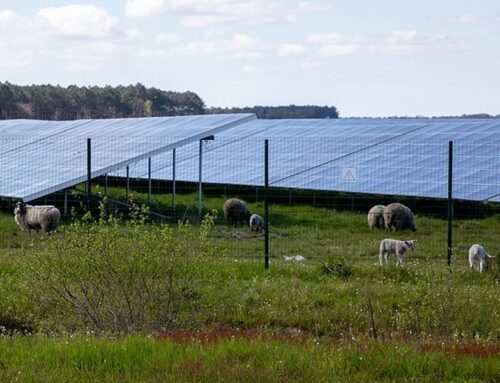Green advocates: ‘Megabill’ will raise electricity costs, cut tax credits for solar, wind
July 2, 2025
While proposed cuts to Medicaid and other safety net programs have drawn more attention, the “megabill” passed by the U.S. Senate Tuesday has left green power advocates feeling, well, drained.
The bill, which is now bound for the House of Representatives, drastically scales back the availability of tax credits for solar and wind power installations — both at private homes and in large-scale installations. And advocates for renewable energy say the pain will be felt across Pennsylvania, and in both red and blue states alike.
“Why make us pay for power generated at a pollution-spewing plant hundreds of miles away when solar panels on our roofs can keep our lights on more efficiently and without filling the air with toxic emissions?” asked the green-power advocacy group PennEnvironment in a statement.
“Members of Congress should be cheering for clean energy tax credits and voting to extend them, rather than kneecapping them,” the group said.
Development of renewable energy was a centerpiece of former President Joe Biden’s infrastructure investments, which extended the credits into the 2030s. But the Senate bill passed Tuesday is rapidly closing that window: Under its terms, wind and solar projects can seek the credit if construction begins within the next 12 months.
If the work begins after that point, it must be completed by the end of 2027 — a timeframe that many projects would miss, industry experts say, if only because of permitting and supply-chain delays.
Sharon Pillar, the executive director and founder of the Pennsylvania Solar Center, called the provisions “very detrimental.”
“A lot of these projects, in particular larger projects, take several years from the inception to the actual construction … and getting them connected into the grid. The rollback of credits could cost investors and employers who put money into such projects with the understanding the credits would be there,” she said
“We have over 100,000 people in Pennsylvania working in all of those industries, and all those jobs are at risk right now,” Pillar added.
The move would also cost customers — even if they don’t have solar panels themselves. New electricity generation is overwhelmingly coming from renewable sources, Pillar said, amid a time of rising electricity consumption.
“If we don’t build those [renewable projects] — and this bill is going to make it very difficult — there aren’t a lot of new fossil fuel plants that are in that queue currently. … So this poses a major problem for building new generation over the next five years, when we need to be expanding our energy generation. That will increase the price of electricity for every Pennsylvanian.”
Labor groups were wary of the Senate bill from the outset, with a national building trades group warning that provisions such as ending tax credits would result in “the biggest job-killing bill in the history of this country.” Darrin Kelly, who leads the Allegheny-Fayette Central Labor Council, echoed that assessment after the vote.
“We’ve always said here in Western Pennsylvania that we believe in all forms of energy. Renewable, natural gas, nuclear — we’re a group that wants all of it,” he told WESA. “This bill completely neutralizes this country’s energy future.”
The assessment was less grim at Built for America, an industry group backed by players in businesses such as nuclear power, energy storage and carbon-capture technology. Some of those technologies fared better in the Senate bill, which continued tax breaks for such industries.
“We would have liked to have seen a bigger embrace of the tax credits,” said Mitch Carmichael, the group’s executive director and a former lieutenant governor of West Virginia. “These are not giveaways. It was the quintessential sort of American response to the need to produce more energies and to onshore manufacturing. But having said that, there’s still a lot of good things in this bill, and we’re appreciative.”
Carmichael notes the bill could have been worse: An earlier version included a punitive excise tax for projects that made use of goods imported from China. And the phase-out passed Tuesday was less abrupt than an earlier proposal before the Senate.
“We are very appreciative for the senators that stood up to make it a better bill,” he said.
Indeed, red states such as Iowa and Texas have seen large-scale investment in renewables, and Iowa Sen. Jodi Ernst sought unsuccessfully to amend the tax-credit rollback. Carmichael said that there is strong support for renewables even among West Virginians proud of the state’s coal-mining heritage: “Their allegiance is to their family — providing for their children, putting food on the table — and they want to be part of an industry that’s grown and making a positive impact on society.”
But he said that support didn’t always translate into political debates.
“I think the reason there was an effort to strip [credits] out is wrapped up in the political ideology of climate change,” he said.
Built for America has sought to change that script, airing ads addressed to Republicans including Pennsylvania Sen. Dave McCormick that use footage of Trump himself and argue, “Energy tax credits put America first. … America’s comeback depends on American energy.”
In a town hall-style telephone call last week, McCormick said he opposed subsidies because they “distort the markets [and] raise prices for consumers.”
But he said that while he wanted to end the subsidies, “we should do it in a phased way.” Businesses, he said, made investments “based on this expectation of subsidies, so if the subsidies fell off a cliff today, that’d be super-disruptive.”
Having the subsidies end at the conclusion of Trump’s term, he said, would give businesses “a chance to adjust to the fact that the subsidies won’t be there in the future.”
McCormick’s office didn’t respond to follow-up queries from WESA on Tuesday about whether the current timetable was what he had in mind.
But while Carmichael said, “If someone thinks that the fossil fuel industry doesn’t get special treatment in the tax code, they’re mistaken,” he agreed that the Senate bill sets out “a reasonable time frame” for businesses to prepare.
“Obviously, the industry would want a longer runway,” he said, adding, “I think there’s going to be a big rush to get [projects] started.”
Rachel McDevitt of WESA contributed to this report.
Search
RECENT PRESS RELEASES
Related Post



